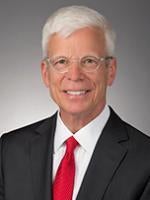In Sylebra Capital Partners Master Fund, Ltd., and P Sylebra Ltd. v. Ronald O. Perelman et al., C.A. No. 2019-0843-JRS (Del. Ch. October 9, 2020), Sylebra Capital Partners Master Fund, Limited and P Sylebra Ltd. (together, “Plaintiff”), had sued Scientific Games, a Nevada corporation (“Company”), and its controlling stockholder and members of its Board (“Defendants”) for breaches of fiduciary duty and violations of the Delaware General Corporation Law (“DGCL”). The Company’s Nevada bylaws, however, contained a provision requiring stockholders to bring claims for breach of fiduciary duty in the courts of Clark County, Nevada. The Delaware Court of Chancery (the “Court”) granted Defendants’ motion to dismiss and held that Plaintiff’s claims were subject to the forum selection provision in the bylaws of the Company and must be brought in Nevada courts.
This controversy involves an alleged brinksmanship play by the gaming Company’s majority stockholder, billionaire Ron Perelman, to use the re-domestication laws of Delaware and Nevada to force a redemption of hedge fund giant Sylebra’s minority shares in the Company at a below market price on the pretext that press reports in the New York Times that pro-Russian groups were using payment terminals of another Sylebra subsidiary to fund the war in eastern Ukraine violated owner suitability rules of gaming companies. The Court appeared somewhat incredulous of the “Plaintiffs’ attempt to create abstract art with creative pleadings” that stockholders of a Nevada corporation were invoking fiduciary duties under the DGCL, even though (1) Plaintiffs sought to invalidate provisions of Delaware constitutive documents that no longer exist, (2) Plaintiffs were stockholders of the Company at the time it left Delaware for Nevada and never objected, (3) Plaintiffs would require the Court to decide whether provisions of constitutive documents of a Nevada corporation are enforceable, (4) the mandatory Nevada forum selection bylaws were broad and unambiguous, and (5) there was already a pending first-filed action in Nevada. Whether the Plaintiffs’ essential premise was valid will not be known from this case, as the Court ruled on the narrow Delaware issues presented.
The Company was a Delaware corporation until it “re-domesticated” to Nevada by merger, and Plaintiff invested in the Company when it was organized under Delaware law. The conduct giving rise to the claims began when Defendants owed fiduciary duties to a Delaware corporation and its stockholders and the Company was subject to the DGCL. As such, Plaintiff argued that it properly asserted its claims in Delaware. Defendants moved to dismiss.
Plaintiff alleged that Defendants carried out and caused regulators to carry out, investigations into its “suitability” as a stockholder (as required by gaming industry regulations to which the Company is subject) as pretext for the Board Chairman and controlling stockholder’s efforts to force Plaintiff, the second largest stockholder, out. Article Tenth of the Company’s then-operative restated certificate of incorporation, provided that, “all Securities of the [Company] shall be held subject to the suitability standards” and set out related criteria by which the Company could deem that a stockholder was a “Disqualified Holder.” If the Board deemed any stockholder to be a Disqualified Holder, then the Company could require it either to divest or allow the Company to redeem the stock at a specified price.
Following the launch of these investigations into Plaintiff’s qualification, the Board amended its Delaware bylaws to allow the Company to invalidate the shares of any stockholder that had received a redemption notice following a determination that the stockholder was a Disqualified Holder. Plaintiff did nothing to challenge these new bylaws at the time.
Thereafter, the Company announced its plans to enter into a merger for the purposes of reincorporating the Company in Nevada (the “Reincorporation”). According to Plaintiff, the provided proxy materials were materially false and misleading in several respects and did not accurately disclose why the new Nevada bylaws (the “Nevada Bylaws”) would contain a forum selection bylaw designating the courts of Clark County, Nevada as the sole and exclusive forum to litigate stockholder disputes (the “Forum Selection Bylaw”). The Reincorporation was unanimously approved by the Board and by a majority of the Company’s stockholders, and was completed in January 2018. In June 2019, the Company filed suit against Plaintiff in Nevada state court to compel Plaintiff’s compliance with the suitability investigation under the Company’s Nevada Bylaws (the “Nevada Action”). After its attempt to remove the Nevada Action to federal court failed, Plaintiff filed this Delaware action in October 2019.
At the outset, the Court stated that the Plaintiff’s complaint would have the Court declare provisions of the Company’s Nevada charter and bylaws unenforceable, contrary to the internal affairs doctrine (a form of choice of law doctrine) that only one state has the authority to regulate the corporate affairs of a corporation. The Court stated that the Company has a Forum Selection Bylaw that requires that the Plaintiff bring its claim in Nevada, and that unless there is good reason not to enforce that bylaw, Plaintiff “has no business bringing its claims in this court.”
In its procedural analysis, the Court noted that, forum selection bylaws are presumptively valid and should be specifically enforced unless the resisting party clearly shows that enforcement would be unreasonable and unjust, or that the clause is invalid for such reasons as fraud and overreaching.
Plaintiff advanced three reasons the Court should decline to enforce the Forum Selection Bylaw: (1) it did not consent to the bylaw, (2) the bylaw is both unjust and unreasonable and (3) the bylaw was procured by fraud. The Court addressed each argument in turn.
First, Plaintiff maintained it did not consent to the Forum Selection Bylaw because, at the time the Company adopted the bylaw, Plaintiff had no ability to sell its shares due to transfer restrictions. In evaluating such claim, the Court stated that the ability of a board of directors of a Delaware corporation to adopt binding bylaws is an essential part of the contract stockholders assent to when they buy stock. The link Plaintiff attempted to draw between the ability of a stockholder to sell its shares and its consent to the corporation’s bylaws finds no support in Delaware law and Plaintiff was unable to cite any.
In assessing Plaintiff’s second assertion, the Court noted that the reasonableness of a forum selection clause should be evaluated on a case-by-case basis. In such an analysis, the resisting party “bears a heavy burden” to demonstrate that enforcement would “place [it] at an unfair disadvantage” or “otherwise deny [it its] day in court.” Plaintiff argued that the timing of the wrongdoing can be relevant to enforcement of a forum-selection bylaw, pointing to non-Delaware authority, Galaviz v. Berg and In re Facebook, where the courts, purportedly applying Delaware law, held that a forum selection clause will be deemed unenforceable when it was “adopted by the directors who are defendants in [the] action, after the majority of the purported wrongdoing is alleged to have occurred.” The Court declared this to be a misstatement of Delaware law. A stockholder in a Delaware corporation gives consent to be bound by current and future bylaws when it buys stock. Whether or not the alleged wrongdoing comes before or after the adoption of a forum selection bylaw is irrelevant in determining the reasonableness or overall enforceability of the bylaw. Plaintiff further asserted that, enforcement would be unreasonable given the forum selection issue was an essential component of the alleged scheme aimed at Plaintiffs’ investment. The Court stated that such an argument attempts to answer the wrong question. The fundamental inquiry is whether the stockholder has alleged “well-pled facts calling into question the integrity” of the court chosen in the forum selection bylaw, or “explain[ed] how the defendants have advanced their ‘self-interests’ by having the claims . . . adjudicated in those courts instead of a Delaware court.” Plaintiff had not alleged such facts. Nevada courts were and remained available to Plaintiff to adjudicate its claims, even if those claims, in some measure, implicated Delaware law.
Plaintiff lastly argued that the Forum Selection Bylaw was procured by fraud because it was enacted as part of the scheme to shield Defendants from liability for targeting and destroying Plaintiff’s investment. All averments of fraud must be stated with particularity under applicable Chancery Court rules. To meet the particularity requirement, a plaintiff often must allege: “the time, place, and contents of the false representation, the identity of the person(s) making the representation, and what he intended to obtain thereby.” Plaintiff did not plead a fraud claim, either with respect to the Forum Selection Bylaw or otherwise. However, the Court stated that, even if Plaintiff had attempted to plead that the Reincorporation was procured by fraud, it would be irrelevant in determining whether the Forum Selection Bylaw itself was procured by fraud. If the Forum Selection Bylaw is valid and enforceable in its own right, then whether there was fraud associated with the Reincorporation is a matter for the Nevada court to decide. The Reincorporation proxy materials clearly stated that the Company intended to adopt the Forum Selection Bylaw and attached the proposed Nevada Bylaws thereto. Plaintiff did not plead any basis to infer fraud in the adoption of the Forum Selection Bylaw.
The Court thus found that Plaintiff failed to carry its “heavy burden” to demonstrate that the Forum Selection Bylaw was unenforceable. That clause mandates that the parties litigate their disputes in Nevada, and as such, Defendants’ motion to dismiss was granted.





 />i
/>i

